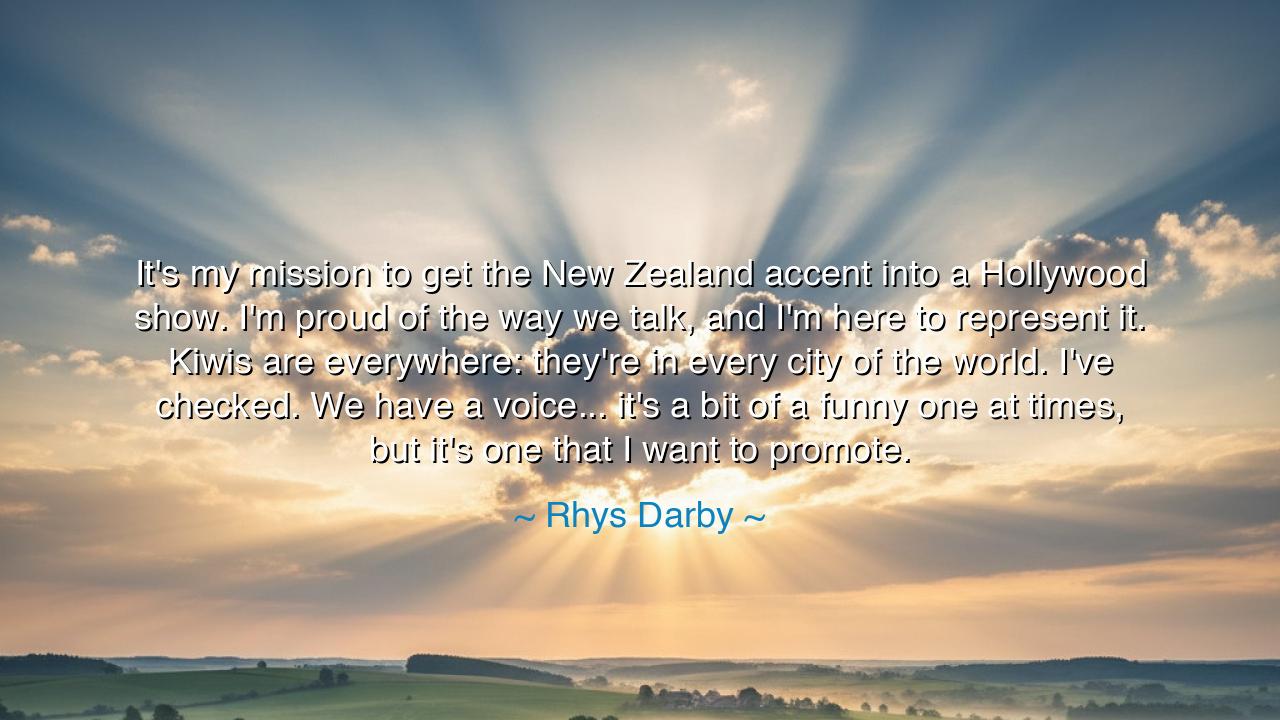
It's my mission to get the New Zealand accent into a Hollywood
It's my mission to get the New Zealand accent into a Hollywood show. I'm proud of the way we talk, and I'm here to represent it. Kiwis are everywhere: they're in every city of the world. I've checked. We have a voice... it's a bit of a funny one at times, but it's one that I want to promote.






The words, “It’s my mission to get the New Zealand accent into a Hollywood show. I’m proud of the way we talk, and I’m here to represent it. Kiwis are everywhere: they’re in every city of the world. I’ve checked. We have a voice... it’s a bit of a funny one at times, but it’s one that I want to promote,” are spoken by Rhys Darby, the New Zealand actor and comedian whose laughter carries both humor and heritage. Beneath the mirth, his declaration shines with a deeper fire: the pride of identity, the courage of representation, and the love of one’s homeland. Though wrapped in levity, his words ring with the timeless cry of every people who have ever sought to have their voice heard among the nations.
Darby’s mission, though humble in appearance—a mere accent, a way of speaking—touches something ancient and profound. For language is not just sound; it is soul made audible. The accent of a people carries within it their mountains, their seas, their winds, their laughter. When Rhys Darby says he wishes to bring the New Zealand voice to the world, he speaks not only as an entertainer, but as a herald of culture. His words say, “We, too, belong in the chorus of humanity. We, too, have a melody worth hearing.” In this, his mission becomes a heroic act: to ensure that his small island nation’s tone and rhythm are not drowned in the vast roar of global voices.
To the ancients, the voice was sacred. The poets of Greece, the orators of Rome, the bards of Celtic hills—they all knew that to speak in one’s own tongue was to claim one’s place in the cosmos. A people who lose their voice lose their spirit; a people who cherish it preserve their immortality. Rhys Darby’s humor, his playfulness, his self-mocking wit—all are instruments in this greater art: to make the world listen and smile, not merely at him, but at the spirit of New Zealand itself. His mission may wear the garb of comedy, but its heart is woven of pride and belonging.
Consider the journey of another son of a distant land—Anthony Hopkins, born in Wales, who once said that he carried his accent like a badge of origin. When he first arrived in America, the pressure to speak with an English or American tone was great, yet he refused to erase his roots. Instead, he infused his performances with the music of his homeland, letting the cadence of the Welsh valleys color his speech. So too does Rhys Darby’s New Zealand voice travel the world—not polished away, not hidden, but offered with joy and confidence. In a world that often prizes sameness, these men remind us that authenticity is power, and that the truest art springs from the soil of one’s origin.
When Darby speaks of promoting the Kiwi accent, he also speaks of dignity through difference. Many have felt the sting of being told their voice is “funny,” “odd,” or “provincial.” But the wise turn mockery into strength. To laugh at oneself without shame is to be unconquerable. The accent, once a mark of otherness, becomes a banner of unity. When he jokes about its quirks, he teaches the world—and his own people—that to love your voice is to love your identity. For the sound of your words is the echo of your ancestors; it is their courage, their humor, and their hope, living again in you.
The lesson of this quote is not limited to New Zealand. It is a call to all who come from small places or quiet cultures: Do not hide your voice; the world needs it. Speak as your heart was taught to speak. Sing in your own rhythm. For every people has something that no empire, no power, no wealth can imitate—their unique way of seeing, feeling, and speaking. When we preserve this, we preserve the richness of the human tapestry. The rivers of the earth do not all sound the same, yet together they make the song of the world.
So, my child, let these words take root in your heart: Be proud of your voice. Whether it carries an accent, a dialect, or the quiet tone of humility, let it ring clear. Do not trade your uniqueness for acceptance, nor your truth for applause. If others laugh, let them—laughter cannot drown out authenticity. Walk into every room, as Rhys Darby does, with humor and courage, carrying the sound of your people like a song. For one day, that very voice may remind the world that greatness does not always come from the loudest, but from those who dare to speak, in their own way, with joy and with pride.
And so, the message endures: every accent is a heartbeat, every word a footprint of belonging. To cherish it is to honor the land and the love that shaped you. Rhys Darby’s mission, though spoken in jest, is a sacred one—to make laughter a vessel of identity, and to prove that even the smallest voice, when spoken with pride, can echo across the world.






AAdministratorAdministrator
Welcome, honored guests. Please leave a comment, we will respond soon